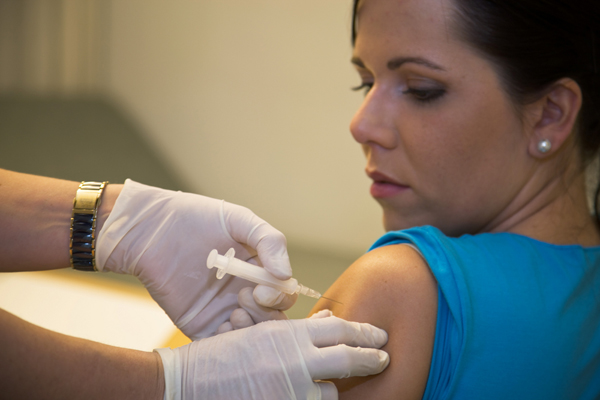Reports Of Flu Vaccine Shortages Contrary To Manufacturers’ Accounts


As the US heads further into its worst flu season in the past decade—the virus is now widespread in 47 states and 24 report very high levels of the disease—some areas are reporting flu shot shortages. Centers for Disease Control Director Tom Frieden told reporters that high demand for the influenza vaccine has created “spot shortages,” at pharmacies and doctors’ offices, and there are also reported shortages of Tamiflu, used to treat symptoms in children who have been infected.
“We are hearing of spot shortages. Given the time in our flu season, it isn’t surprising. People who haven’t been vaccinated and want to get the vaccine may have to look in several places for it,” CDC spokesman Tom Skinner said on Thursday.
Although the CDC says 112 million of the 137 million flu-vaccine doses have already been administered this season, vaccine manufacturers say they have plenty of inventory. Medimmune, which manufactures FluMist—a nasal spray that can be administered to healthy 2- to 49-year-olds—told CNN is produced 12 million doses for the current flu season to fill customer orders, but it also produced extra doses.
“Right now we currently have 310,000 extra doses that could ship tomorrow”” Tor Constantino, MedImmune spokesperson, told CNN. “All of those expire next month. Another 70,000 doses are available that could ship tomorrow and those expire in March.”
Glaxo Smith Kline, the maker of traditional flu vaccines Fluarix and FluLaval, said it also has plenty of supply to meet consumer demand this season. The company said it produced about 25 million doses of vaccine, most of which have already shipped.
A relatively new vaccine is available this year, as well. Fluzone—manufactured by Sanofi Pasteur—is a shot with a very shot needle that injects the vaccine into the patient’s skin rather than muscle. Fluzone is designed to be less intimidating than a traditional flu shot. Sanofi Pasteur created more than 60 million doses of Fluzone for the United States’ population.
“This product is available in two presentations: Fluzone intradermal vaccine for ages 18 to 64 and Fluzone High-Dose vaccine for ages 65 and above,” Sanofi Pasteur director of public relations Michael Szumera told CNN. “Additionally, in response to unanticipated late-season demand, we have arranged for a limited supply of additional vaccine in 0.5-milliliter unit dose vials. This product is indicated for ages 6 months and above. We are accepting orders for this product and anticipate being able to start shipping in late January.”
It’s not too late to get vaccinated, but consumers should do so sooner rather than later for a variety of reasons. Those vaccinated with this season’s flu shot are about 62 percent less likely to come down with influenza, according to the CDC. But it takes about two weeks for the vaccine’s effects to fully set in. Plus, although vaccine manufacturers say supplies are still available—you may just have to search for them in some areas—once they’re gone, they’re gone.
“At this point we are not able to make any more vaccine because we are gearing up for next year’s vaccine,” Szumera told Reuters.
[Image via Shutterstock]









































